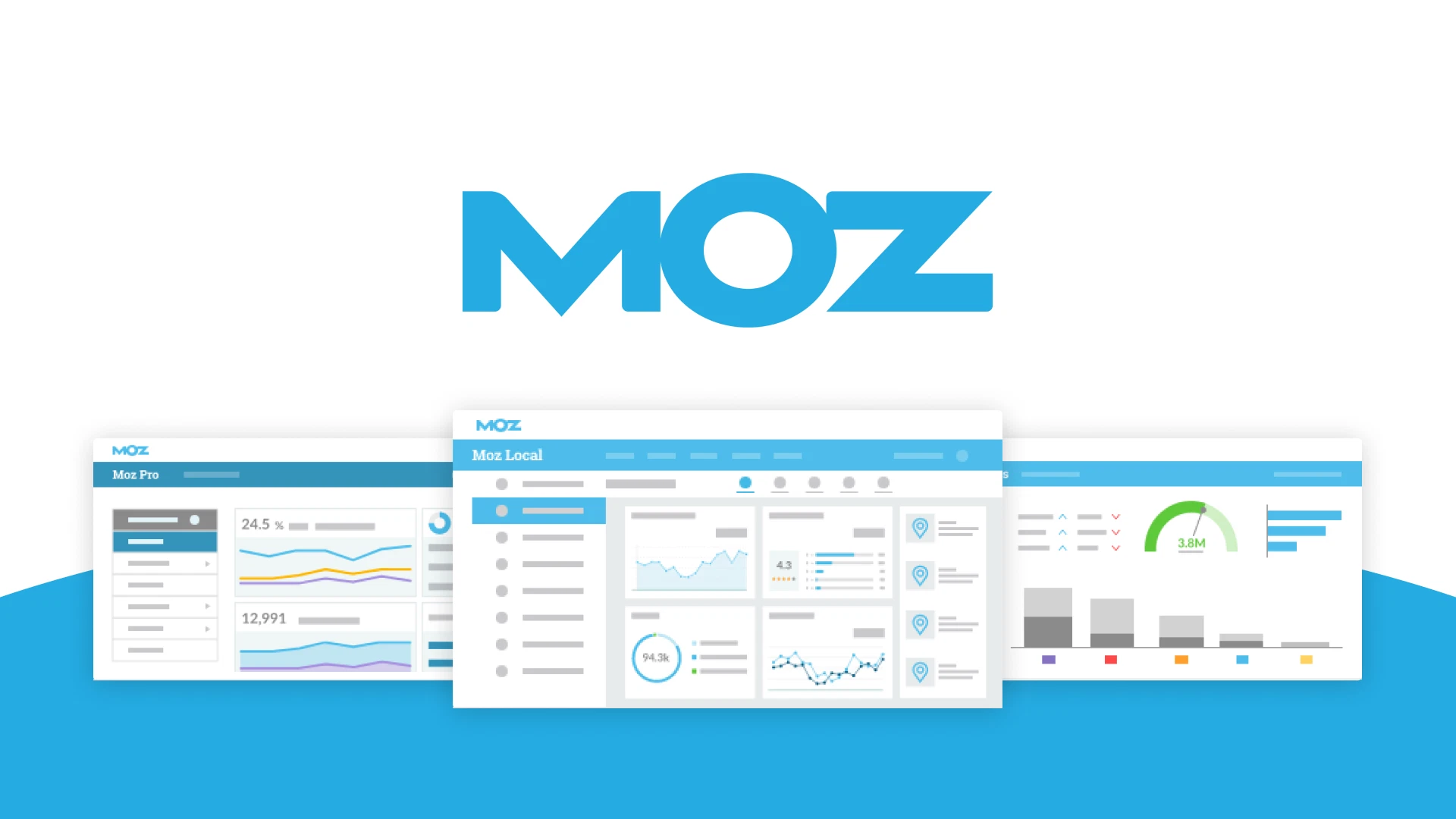Moz SEO tools have one of the most well-known names in the world of Search Engine Optimization (SEO) software. Founded in 2004 by Rand Fishkin and Gillian Muessig, Moz, formerly SEOmoz, has evolved from being a small consulting company into a leading provider of SEO tools, resources, and community support for marketers, businesses, and SEO professionals around the world.
Moz SEO Tools
At the core of Moz SEO tools, the mission is to simplify search engine optimization for everyone, providing a toolkit that make complex strategies accessible to marketers of all skill levels, from beginners to experts. This philosophy is evident in this suite of SEO tools, which is widely regarded for its intuitive design, educational resources, and depth of functionality.
Moz offers a variety of SEO tools and services. The flagship offering is Pro, a comprehensive suite that help users with keyword research, rank tracking, site audits, backlink analysis, and on-page optimization. In addition, there is a package for managing local business listings, MozBar for browser-based SEO insights, and a variety of free tools and resources like the Keyword as well as Link Explorer, and Domain Analysis tool.
To understand the value of Moz SEO tools, it helps to look at them in more detail, examining their individual components, the underlying philosophy that drives their development, and the role they play in the larger SEO ecosystem.
Moz Pro is the centerpiece of these offerings. It is an all-in-one SEO toolkit designed to help users improve their search visibility, track progress, and discover new opportunities. Its primary components include keyword research, rank tracking, site audits, backlink analysis, and on-page optimization.
Queries research is one of the most important aspects of search engine optimization, and Moz SEO tools offer powerful tools to make this process easier and more effective. The Keyword Explorer is the core toolkit for keywords research, allowing users to find and evaluate queries based on search volume, difficulty, organic click-through rate (CTR), and priority scores that combine all of these metrics to identify the most promising opportunities.
Keyword Explorer is notable for its ability to generate keyword suggestions, provide Search Engine Results Page (SERPs) analysis, and help users prioritize keywords strategically. By evaluating difficulty, users can assess how challenging it will be to rank for specific terms compared to competitors. This enables marketers to balance high-volume, high-competition terms with lower-volume, easier-to-rank-for long-tail keywords.
Rank tracking is another central feature of Moz SEO tools. With this, users can monitor how their targeted keywords are performing over time in the search results. This tracker allows users to keep an eye on keyword rankings across different locations and devices, giving insights into local SEO performance as well as broader organic visibility.
One of the benefits of Moz’s rank tracking is its historical data, which allows marketers to see trends and measure the impact of their SEO efforts over time. This is especially useful for agencies and teams who need to report results to clients or stakeholders.
Audits are an essential part of SEO because they help identify technical issues that can undermine a site’s ability to rank. Moz SEO tools include a Site Crawl feature that automatically scans websites for common issues such as broken links, duplicate content, missing metadata, and other technical SEO problems.
Moz’s Site Crawl tool prioritizes issues by severity, helping users focus on the problems that will have the greatest impact on their SEO performance. In addition, the toolkit offers recommendations for fixing issues, making it accessible to users who may not have deep technical knowledge.
Backlink analysis is another pillar of Moz SEO tools. The Link Explorer is one of the industry’s most widely used research toolkits for backlinks, which are links from other websites to your own. These are among the most important ranking factors in Google’s algorithm. Link Explorer allows users to analyze their own backlink profiles, discover new linking opportunities, and research competitor backlinks.
Link Explorer includes metrics such as Domain Authority (DA) and Page Authority (PA), which are proprietary Moz metrics that predict how likely a website or page is to rank in search results. The first one, in particular, has become a widely used benchmark in the SEO industry for assessing the strength of a website’s link profile.
While Domain Authority is not a ranking factor used by Google itself, it is a useful proxy for understanding the relative competitiveness of a website. Moz SEO tools calculate Domain Authority using a machine-learning (ML) model that considers the quantity and quality of backlinks, among other factors.
Beyond these core features, Moz Pro also includes on-page optimization tools that help users improve the relevance and SEO-friendliness of their individual pages. These toolkits analyze elements such as title tags, meta descriptions, header tags, and keyword usage, offering actionable recommendations for optimization.
Pro’s Campaigns feature ties everything together by allowing users to monitor their websites’ SEO performance holistically. It tracks keyword rankings, site crawl issues, link data, and more in a single dashboard, providing an organized, high-level view of SEO health and progress over time. Moz SEO tools are offered as subscription services with multiple pricing tiers designed for individuals, small businesses, and agencies. The plans vary in terms of the number of keyword queries, tracked keywords, campaign limits, and other usage allowances.
While Pro is the centerpiece of Moz’s product lineup, it is not the only tool offered. As mentioned, Local is another popular product, designed specifically for businesses that want to improve their visibility in search results locally. Local SEO is critical for brick-and-mortar businesses, service-area businesses, and any company that relies on customers in a specific geographic area.
Moz Local helps businesses manage their business listings locally across a wide range of online directories, such as Google Business Profile, Facebook, Yelp, and many others. A popular choice among Moz SEO tools, the core functionality of Local includes the ability to distribute accurate name, address, phone number, hours information to major directories and data aggregators. By maintaining consistent listings across the web, businesses can improve their chances of appearing in local search results and reduce customer confusion caused by incorrect information.
Moz Local also offers features for monitoring listing performance locally, such as tracking profile completeness, managing reviews, and seeing how often listings are viewed or interacted with. This makes it easier for businesses to measure the impact of their local SEO efforts and make improvements over time.
MozBar is another important offering in Moz SEO tools. It is a free browser extension, available for Chrome, that provides instant search engine optimization insights while users browse the web. When visiting a webpage, MozBar displays key metrics such as Page and Domain Authority, link data, and on-page elements.
This tool is particularly popular among SEO professionals for competitive research. With MozBar, users can quickly assess the strength of competitor pages, analyze on-page SEO elements, and export data for further analysis. It also includes a SERP overlay feature that adds Moz metrics to Google’s search results pages, making it easier to evaluate the competitive landscape for any given query.
In addition to these paid Moz SEO tools, there is a variety of free ones that help users get started with basic search engine optimization research and analysis. Examples include Domain Analysis, which provides a snapshot of key SEO metrics for any domain, and Free Keyword Explorer queries that let users find and evaluate keywords without a subscription.
Moz’s approach to building SEO tools is heavily influenced by its educational mission. The company is known for its focus on making search engine optimization accessible through clear explanations, helpful documentation, and a wealth of learning resources. The Moz Blog is one of the most popular and respected SEO blogs in the industry, featuring in-depth posts, research, case studies, and insights from experts around the world.
Whiteboard Friday, a long-running video series, is another example of the company’s commitment to Moz SEO tools. In these videos, staff and guest experts break down complex search engine optimization topics in a visual and approachable way, helping viewers understand the nuances of search optimization.
Moz also maintains a robust community platform where users can ask questions, share insights, and connect with other SEO professionals. This community-oriented approach has helped the company build a strong reputation as not just a tool provider, but as a trusted resource and thought leader in the SEO industry.
From a technical perspective, Moz SEO tools and methodologies are a key part of what makes them valuable. For example, Link Explorer is powered by one of the largest indexes on the web, with billions of pages crawled and links analyzed. While it competes with other major backlink research tools like Ahrefs and Majestic, Moz emphasizes transparency in how its metrics are calculated and offers explanations of its scoring systems, such as Domain Authority.
Moz also invests in research to improve its tools over time. The company regularly updates its algorithms for Domain Authority and other metrics to better reflect changes in Google’s ranking factors and the broader search ecosystem.
However, Moz SEO tools are not without their limitations. Some users find that the links index is smaller or less up-to-date than competitors like Ahrefs or Semrush. Others prefer the more advanced reporting features of rival platforms. Nevertheless, Moz remains a popular choice for many SEO practitioners, particularly those who appreciate its usability, educational resources, and strong community support.
In terms of competition, Moz exists in a crowded field of SEO tools providers. Major competitors include Ahrefs, Semrush, Majestic, Screaming Frog, and Serpstat, among others. Each of these has its own strengths. For example, Ahrefs is known for its massive backlinks index and robust keyword research tools. Semrush offers an extensive suite for SEO, PPC, content marketing, and competitive analysis. Screaming Frog is highly regarded for its detailed site crawling and technical SEO capabilities.
Moz SEO tools differentiate themselves through their focus on accessibility, ease of use, and education. While they may not offer the deepest feature set in every area, these are designed to be intuitive and approachable, making them especially appealing to small businesses, agencies with non-technical clients, and marketers who want to learn SEO while they work.
Another area where Moz has made a mark is its emphasis on transparency is that the company was an early advocate of ethical SEO, which is the idea that sustainable, long-term search engine optimization success comes from following search engine guidelines, creating high-quality content, and building genuine links rather than engaging in manipulative tactics.
This philosophy permeates Moz SEO tools, resources, and community. The company has long positioned itself as an ally to marketers who want to do SEO the right way. This approach resonates with many specialists who are wary of unethical practices that may deliver short-term gains but risk long-term penalties from search engines.
Moz’s history is also intertwined with the development of some of the SEO industry’s most widely used concepts. Domain Authority, for example, is an invention of the company itself, becoming a de facto industry standard for evaluating the relative strength of websites. While Google does not use Domain Authority as a ranking factor, many marketers rely on it as a convenient way to benchmark sites and plan outreach strategies.
Over the years, Moz SEO tools have also invested in research projects and data studies, helping advance understanding of how search engines work. The Search Ranking Factors survey, which ran for many years, asked hundreds of SEO professionals to weigh in on what factors they believed most influenced rankings. Though Moz eventually retired this survey, it helped foster a shared understanding of search engine optimization best practices and evolving trends.
Moz has also played a role in advocating for greater clarity and fairness in how search engines operate. The company has been vocal about the need for engines to provide better communication to webmasters, and it has contributed to industry-wide discussions about topics like link spam, algorithm transparency, and the ethics of SEO.
Beyond Moz SEO tools and educational content, the company has cultivated a sense of community that distinguishes it from some of its competitors. MozCon, the company’s annual conference, is one of the most well-regarded events in the SEO industry, attracting speakers and attendees from around the world. MozCon is known for its high-quality presentations, practical insights, and welcoming atmosphere.
This focus on community-building aligns with Moz’s overall brand. While many SEO tools providers emphasize competitive advantage and growth hacking, the company has often emphasized collaboration, learning, and ethical marketing.
As the search engine optimization landscape has evolved, so has Moz SEO tools. In recent years, the company has introduced updates to its metrics, improved its link index, and expanded the capabilities of its toolkits to keep pace with changing user needs and search engine algorithms. The company has also undergone leadership changes and strategic shifts, such as its 2021 acquisition by iContact, aimed at expanding its reach and resources.
Despite these changes, Moz’s core mission has remained consistent, which is to make SEO accessible, understandable, and effective for everyone. Its tools reflect this mission by balancing robust functionality with user-friendly design, making them suitable for solo practitioners, in-house teams, and agencies alike.
For many professionals, Moz SEO tools represent a starting point in their journey, often the first set they use to understand and implement strategies. Even for experienced specialists who use multiple toolkits in their workflows, Moz often remains included because of its ease of use, helpful data, and clear reporting.
Looking forward, Moz faces the same challenges and opportunities as the broader SEO industry. Search engines are growing more sophisticated, incorporating AI and machine learning to deliver better results to users. Search itself is diversifying, with new surfaces like voice search, featured snippets, and AI-powered chat interfaces changing how people find information.
To remain relevant, Moz SEO tools will need to continue evolving, expanding their data sources, and educating users about new best practices. Given its long history of adapting to change and supporting its community, there is good reason to believe it will do so.
Moz’s SEO tools represent one of the most well-known and widely used solutions in the world of search marketing. From the Pro comprehensive suite for keyword research, rank tracking, site audits, and backlink analysis, to Moz Local’s listing management and MozBar’s browser-based insights, the company offers a range of tools designed to make SEO accessible and effective.
What sets Moz SEO tools apart is not just the technology, but commitment to education, transparency, and community. By making search engine optimization understandable and supporting ethical practices, the company has helped countless marketers improve their search visibility and grow their businesses. While it faces strong competition in a rapidly evolving industry, Moz’s combination of user-friendly design, reliable data, and educational mission ensures it will remain an important player in the SEO space for years to come.
The future of Moz SEO tools will likely involve continuing to refine while expanding into new areas of search engine optimization and marketing. As engines change, incorporating more AI, focusing on user intent, and evolving their ranking algorithms, SEO professionals will need tools that help them adapt. Moz’s strong foundation in research, its large as well as loyal user community, and its emphasis on clear, ethical practices position it well to meet these challenges. By staying true to its mission of making SEO accessible and understandable, Moz can continue to serve as a trusted partner for everyone seeking long-term search success.








